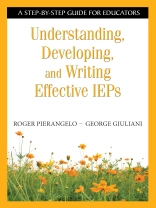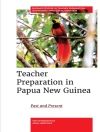‚The authors tackle an often complex process in an understandable, sequential manner.‘
—Mary L. Jackson, Resource Teacher
Roosevelt Elementary, Kingsport, TN
Clear, helpful answers for educators involved in developing Individualized Education Programs.
Creating and evaluating Individualized Education Programs (IEPs) for students with disabilities is a major responsibility for teachers and school leaders, yet the process involves legal components not always understood by educators. In Understanding, Developing, and Writing Effective IEPs , legal and special education experts Roger Pierangelo and George Giuliani provide K–12 educators with a clear step-by-step plan for IEP development that helps guarantee a Free and Appropriate Public Education (FAPE) in the Least Restricted Environment (LRE) for students with disabilities.
Frequently Asked Questions and a glossary of easy-to-understand special education terminology enable every member of the IEP team to develop a meaningful, functional program that meets a student′s unique needs. Aligned with the latest reauthorization of IDEA 2004, this practical resource also includes:
- Descriptions of the IEP process
- Sample materials from authentic IEPs
- Checklists, forms, and reproducibles for planning an effective IEP meeting
- Guidelines that encourage positive collaboration between educators and families
Ideal for teachers and administrators, this jargon-free text provides techniques, suggestions, and information for all aspects of the IEP process.
Inhaltsverzeichnis
Preface
Acknowledgments
About the Authors
Introduction
1. Foundational Issues in Individualized Education Programs (IEPs)
Introduction
Purpose of an IEP
13 Principles of IEP Collaboration
2. IEP Preparation
Preparation Before the IEP Meeting
Setting Up the IEP Meeting
Giving Notice of an IEP Meeting
When an IEP Meeting Must Be Convened
Helping Students Prepare
Characteristics of an Effective IEP Team Meeting
3. IEP Participants
IEP Team Members–Roles and Responsibilities
Excusal of Team Members
Questions and Answers About Other IEP Team-Related Topics
4. IEP Team Meetings
The Team Process
During the Meeting–Focused but Flexible
Guidelines for Running the IEP Meeting
5. Step-by-Step Development of the IEP
Step 1: Formulate a Statement of the Student′s Present Level of Academic Achievement of Functional Performance
Step 2: Determine the Four Need Areas
Step 3: Consideration of Special Factors
Step 4: Determination of Measurable Annual Goals (Including Academic and Functional Goals)
Step 5: Reporting Progress Toward the Annual Goals to Parents
Step 6: Determine the Extent to Which the Student Will Not Be Able to Participate in General Education Programs (LRE Explanation)
Step 7: Determine Placement Options
Step 8: Determine Related Services
Step 9: Determine Program Modifications, Accommodations, Supplementary Aids, and Services
Step 10: Determine the Need for Assistive Technology Devices and Services
Step 11: Determine the Supports for School Personnel on Behalf of the Student
Step 12: Determine the Ability of a Student to Participate in State and District Assessments
Step 13: Determine Extended School Year (ESY) Services
Step 14: A Statement of Secondary Transition Service Needs and Needed Transition Services for Students
Step 15: Develop a Statement of Transfer of Parental Rights to the Student Upon Reaching the Age of Majority
Annual Review and Revision of the IEP
Recommendations Upon Declassification
Appendix: Individuals with Disabilities Education Improvement Act of 2004–Section on IEPs (Enrolled as Agreed to or Passed by Both House and Senate)
Glossary
References and Suggested Readings
Index
Über den Autor
George Giuliani is an assistant professor at Hofstra University′s School of Education and Allied Health and Human Services, in the Department of Counseling, Research, Special Education, and Rehabilitation. He is the executive director of the National Association of Special Education Professionals, president of the National Association of Parents with Children in Special Education (NAPCSE), vice-president of the National Association of Special Education Teachers, and an educational consultant for various school districts. He has provided numerous workshops for parents and teachers on a variety of special education and psychological topics.Giuliani earned Board Certification as a Diplomate Fellow in Child and Adolescent Psychology and Forensic Psychology from the International College of Professional Psychology. Giuliani is also a New York State licensed psychologist, certified school psychologist, and has an extensive private practice focusing on children with special needs. He is a member of the American Psychological Association, New York State Psychological Association, the National Association of School Psychologists, Suffolk County Psychological Association, Psi Chi, American Association of University Professors, and the Council for Exceptional Children. Giuliani earned his BA from the College of the Holy Cross, MS from St. John′s University, JD from City University Law School, and Psy D from Rutgers University, The Graduate School of Applied and Professional Psychology.Giuliani is the coauthor of numerous books, including The Big Book of Special Education Resources and The Step-by-Step Book Series for Special Educators.












